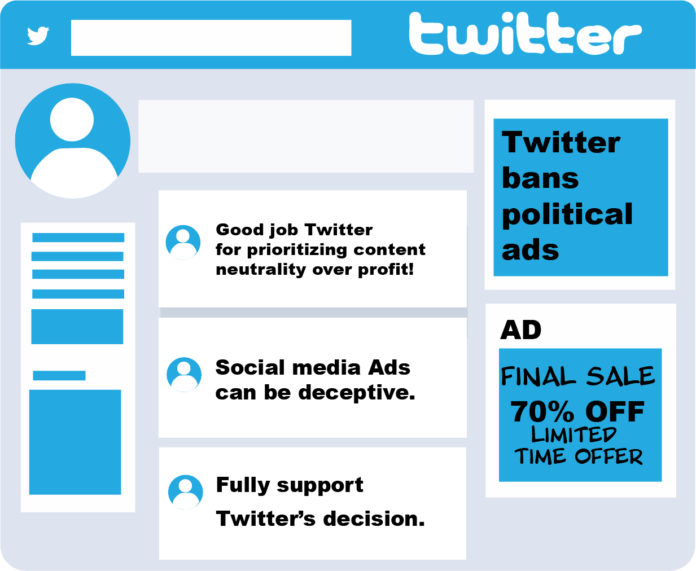As Facebook and Twitter have gone opposite directions in their approach to misleading political ads, much debate has arisen over which approach is more ethical.
While Facebook continues to justify its practices of not fact-checking political ads hosted on its platform, Twitter has taken a stand in banning all political messaging. Twitter CEO Jack Dorsey announced that all political advertising, not only those of candidates, will be banned as of Nov. 22. The final policy will be released Nov. 15.
Facebook’s head of news partnerships, Campbell Brown, posted Wednesday that she does not believe social media sites hold any responsibility for fact checking content on their servers.
“Having spent most of my pre-Facebook career as a journalist covering politics, I have been astonished at the reaction by other journalists to Facebook’s decision not to police speech from political candidates. I strongly believe it should be the role of the press to dissect the truth or lies found in political ads — not engineers at a tech company,” Brown said.
While journalism operates as a fact-checker for society, it is not sufficient in the 21st century with multiple outlets of information. Newspapers are no longer the only source for people to get information, and therefore can not be the sole source to communicate truth to the public. Other social media sites should acknowledge their pivotal role in shaping the American conscience and follow Twitter’s lead in banning all political messages.
The reality is nearly two-thirds of Americans get news on social media, according to 2018 Pew research. For over 40% of Americans, Facebook is their primary outlet for news. While respondents acknowledge likely inaccuracy in news from social media, they continue to prefer the platform due to convenience.
“Internet political ads present entirely new challenges to civic discourse: machine learning-based optimization of messaging and micro-targeting, unchecked misleading information, and deep fakes. All at increasing velocity, sophistication, and overwhelming scale,” Dorsey tweeted Wednesday.
Social media platforms may simply be servers for content that others generate, but the practices of optimization and targeting make social media directors content curators to an extent as well. Technology engineers should recognize their role in determining what the millions of users on their sites view.
Seeing the influence that misleading ads can have, evident in thousands of cases, including the infamous Russian pro-Trump campaign on Reddit, necessitates the type of ban Twitter is enacting.
Censorship can raise concerns. The freedom of speech protected by the First Amendment has remained a central tenet of American values.
As Brown wrote in her post, “It has been a long held American ideal that we win the day with better arguments, not by silencing those we disagree with.”
However, the political advertising ban is not to silence minority or controversial opinions. Rather, the goal is to shut down messages with objective falsity. While there is value to minority opinions, there is no value behind blatantly false statements.
The ban Twitter plans to implement prohibits all political content without discrimination. A ban with content-neutrality ensures that the only agenda being pushed by censorship is the preservation of truth.
In passively allowing the public to misinformed, social media sites are operating in negligence to the greater good. Social media sites hold an integral role in society. They should adopt regulations to take ownership of their influence.






